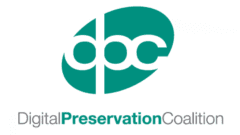Node Hosts
Node host institutions maintain and make use of a locally installed instance of the Emulation-as-a-Service platform that is connected to other nodes in the EaaSI network. Connection to the network includes access to software and emulated software environments shared by other member institutions, including Yale University Library’s seed collection. In these early days of the service, we anticipate nodes will use their instance primarily for testing and development of workflows. As the members of the network become more familiar with the service and our infrastructure improvements are implemented, we hope members of the network will contribute software and environments to the network, participate in ongoing improvements to the EaaS system, and deploy local access platforms that use the emulation service.
Together, EaaSI node hosts comprise a cohort, or an intentional learning community. The EaaSI node host cohort represents several distinct organizational types, collecting concentrations and designated user communities. Working with these various organizations, the EaaSI project staff will identify common pain points, gaps and potential areas of improvement that will shape the design of the EaaSI network and infrastructure.
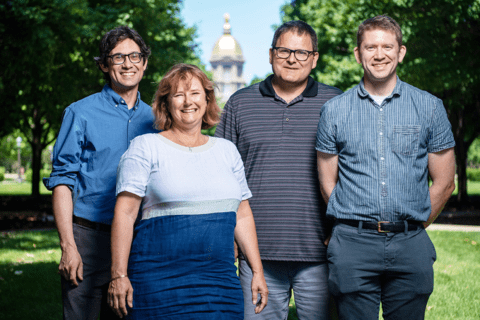
From left to right: Don Brower (Node Lead, Digital Library Infrastructure Lead), Natalie Meyers (E-Research Librarian), Mark Suhovecky (Digital Library Data Curation Developer), & Rick Johnson (Co-Director of Digital Initiatives and Scholarship) Photo by Matt Cashore/University of Notre Dame
Notre Dame University
As scientific research is increasingly born digital, more researchers are using computational resources for simulations and data analysis. Participating in EaaSI is a way we can act on cloud advantages for emulation processes in digital preservation. Our most compelling use cases for emulation center around keeping software running in order to continue to provide access to underlying data for our campus researchers and the broader community at large. Through participation in the EaaSI network, we seek to improve software preservation for our researchers, expand our knowledge of how emulation fits in the context of digital scholarship. Approaching software preservation, emulation, and its infrastructure as a community allows us to move from the current landscape of idiosyncratic solutions to a commons centric approach that ensures greater interoperability with existing tools and platforms and their host institutions. The community can “divide and conquer” particular emulation environments: an emulation can be implemented once, and used across the consortium.
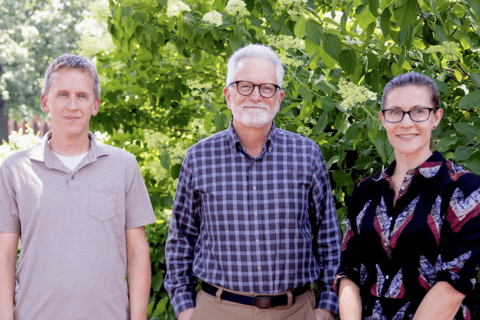
From left to right: Lauren Work (Digital Preservation Librarian), Robert “Chip” German (Node Lead, Scholarly Communication/Program Director) & Jeremy Bartczak (Metadata Librarian)
University of Virginia
The University of Virginia Library is an enthusiastic participant through the Software Preservation Network in Yale’s Emulation As A Service Infrastructure (EaaSI) project. We are motivated strongly by the urgent need to preserve software in ways that make our preservation of digital scholarly and cultural materials more accessible and meaningful.
As preservation professionals (whether or not it is a primary assignment for each of us), we are fond of a commonly expressed perspective: preservation without access is pointless. The preservation of relevant software adds many layers of complexity to the notion of digital preservation while promising critical additional value in the result.
If we lose access to the software component-mix that an object requires to be something other than an unintelligible sequence of bits, the object becomes useless.
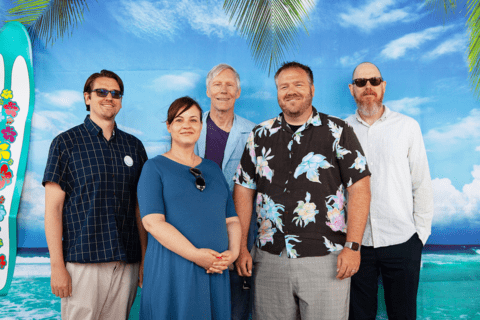
From left to right: Ryan Johnson (Metadata Librarian), Sibyl Schafer (Node Lead, Digital Preservation Analyst), Ron Stanonik (Systems Administrator), Tim Marconi (Library IT Operations Manager) & David Minor (Director of Research Data Curation)
University of California – San Diego
The UCSD Library’s Research Data Curation program has been working with UCSD researchers for over half a decade to curate and preserve the research data produced by our campus. Our large and quickly-growing collection of research data contains long-tail research data file formats as well as software created or used to generate scientific findings. As software environments morph over time, it becomes necessary to capture the original computing environment which produced the data. Therefore, emulation becomes an essential tool in not only accessing data generated in certain environments but also reproducing scientific results years after the original studies have been completed. Approaching software preservation and emulation as a collective action problem provides USCD with the opportunity to learn from other organizations that are grappling with these same issues, and can help us identify how we can ensure that the data we’re curating is accessible and reproducible in the future.
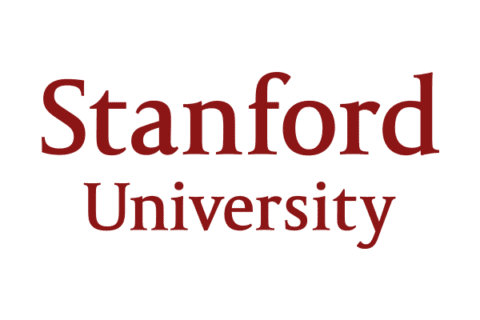
Stanford University
Stanford University has large collections of historic software which are currently inaccessible to our researchers. We are also actively collecting software that has been developed by our faculty for classroom use and by authors of digital publications for the Stanford University Press. We are excited by the potential value offered by emulation to expand access and use of our software collections. A distributed community approach to software preservation is advantageous as it increases the use of this resource type, allows for us to engage with software creators early in the software development lifecycle and it shares local expertise of emulation across multiple academic insitutitions.
As we embark on our work as a node host we look forward to learning how our partner institutions select, validate, and publicize their work. Authentication and rights management across institutional boundaries is one area of interest. We are also keen to learn how we can leverage the sharing of software libraries and configuration data.
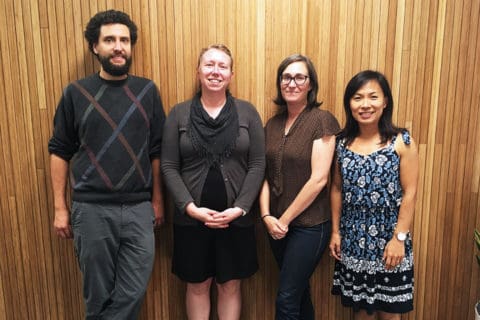
From left to right: Eric Kaltman (Node Lead, CLIR Fellow for Data Curation in the Sciences), Jessica Benner (Computer Science Liaison Librarian), Emily Davis (Project Archivist) & Huajin Wang (Computer Science Liaison Librarian)
Carnegie Mellon University
Most modern activities are dependent in some way or another on a dense network of software and its related technical dependencies. In order to ensure continued access to human knowledge production it is imperative that software preservation become a significant and embedded societal practice. Without a concerted, collaborative effort to maintain, archive, and reveal software data and development practices we run the risk of losing a significant amount of humanity’s history. One significant means of software preservation is emulation, but an emulation solution, at scale, requires more resources than any single institution could reasonably support. The EaaSI project, in gathering use cases from institutions with different collections and collecting priorities, provides an expanding supportive network not possible through monolithic approaches.
Advisors
Advisors to the project are individuals and/or organizations that want to contribute to the development of the network and EaaSI services, but require an alternative to supporting local infrastructure or contributing via a hosted service. Advisors may participate in hosted sandbox testing and will participate in requirements and use case gathering, feedback on documentation and resources, and other related project activities to be identified.
The EaaSI team understands that a commitment to hosting infrastructure (and providing the corresponding staff resources) may not be possible at this time. We value the participation of any interested individuals and institutions who would prefer to remain engaged in the project work without assuming the node host responsibilities.


